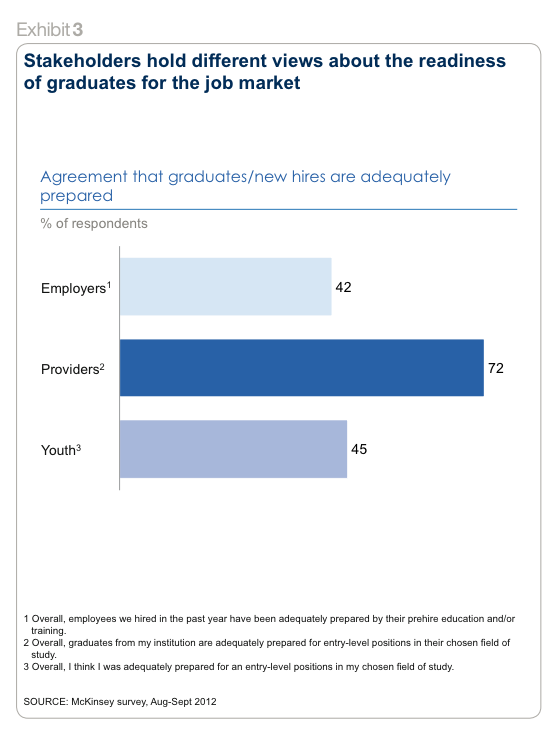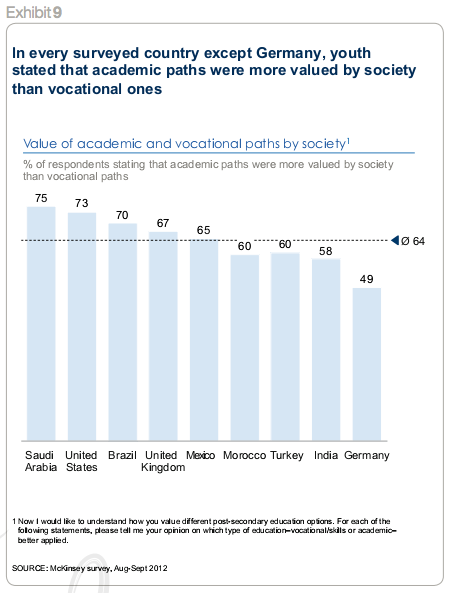A friend of mine linked to this article purporting to explain the skills gap that is affecting not only the United States but also the world. The article basically takes three charts from a much larger report (pdf) that also purports to explain a skills gap, but neither actually do, though, the actual report has some interesting findings that they for some reason completely ignore. Let’s go through the three charts, though.
This first one shows that less than 50% of employers and students think students are ready for jobs after graduation while over 70% of education providers think students are ready. This is an interesting study into the psychology of three economic segments, but there is really no skills gap information here. Students have perpetually felt unready for the job market. That number may have gone up recently, but it’s more likely because the economy is in the tank more than the secondary education system has changed. Employers have also always felt that the students they get lack the job skill necessary for a beginner job. I see no evidence that this has drastically changed recently either.
It’s not the skills that the students lack, though, it’s the culture. Students go from a solo learning experience to a social working experience. This takes a lot of adaptation. They are also used to everything behaving one way for four years and then it changes. This also takes a lot of adaptation. Adaptation is not something that you can learn in school. The businesses that understand this flourish in their hiring. The businesses that don’t complain that the students don’t have the right skills.
Again, nothing surprising about this chart. It turns out that students feel like they get more out of hands on training than sitting in lecture halls. How exactly does this show a skills gap? How has anything changed in the last 50 years? It hasn’t. Yet, somehow we’re supposed to believe that there is a sudden skills gap because students are being taught incorrectly. I think not.
This is also a very dangerous chart. What conclusion do you think most people will come to when reading this chart? On the job training and hands on experience are most effective. I know, lets increase the number of unpaid interns for companies! Unpaid internships are as bad for students as NCAA sports teams. They both have the thinnest veneer of helping the students when what they really do is provide free labor and free scouting of prospective hires.
This is the only chart that has anything interesting. Most countries value an academic path over a vocational path except for Germany. See how this explains a skills gap? Me either. It turns out that people value being a doctor more than being a plumber. Shocking. There is actually something to be learned from this, though. Germany’s education system is pretty interesting. The reason why Germany scores so well in this survey is a direct result of that. Students know from a pretty young age that they are going to go to a vocational school. Thus, they are much more accepting of vocational school.
The United States should probably switch to an education system like Germany, but it flies in the face of everything that Americans hold dear. Imagine being told at grade 10 that you’re going to vocational school. You don’t have much of a choice in the German system. It is certainly much more efficient than the U.S. system, but even I balk at such a callous approach to pigeonholing students.
What is happening in our economy is not a skills gap but a wage gap. Employers are looking for candidates for entry level positions but they’re expecting them to have experience. Then, when a college graduate applies, they are rejected and the employer says they don’t have the skills necessary for the job. To add insult to injury, employers are rejecting candidates that have the necessary skills but have been unemployed for too long because their skills must be rusty. Anyone who has a job and has the resulting skills and experience necessary isn’t applying for the job because the jobs are a step down.
This is why the best way to quickly get out of a slump like this is for the federal government to spend money. Infrastructure improvements would immediately put people back to work and fix a long broken infrastructure. Both of these would spur the economy greatly. Instead, we’re looking at an austerity bomb which everyone agrees will tank the still weak economy.


